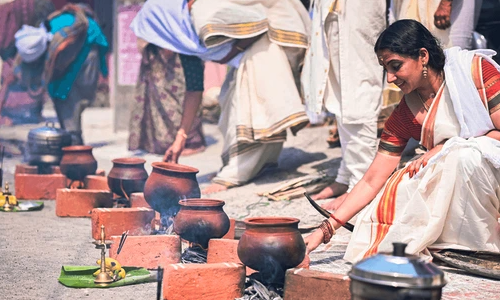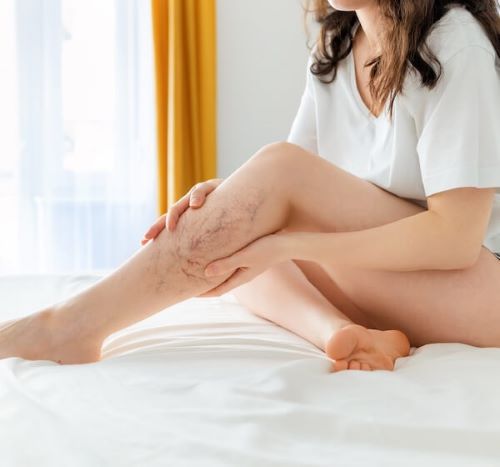Thiruvananthapuram (aka Trivandrum) – the capital of the Indian state, Kerala, is celebrating Attukal Pongala festival tomorrow! If you’re from Trivandrum, I bet you’re excited for the event. Yeah, me too! Every year, I eagerly wait for the event to see the streets of Thiruvananthapuram become a showcase for the devotion and enthusiasm of millions of women. What is Attukal Pongala? For those who are not aware, Attukal Pongala is an annual festival celebrated at the Attukal Bhagavathy Temple located in Thiruvananthapuram, Kerala. It is one of the largest all-women religious gatherings in the world (even made it to the Guinness Book of World Records!). The highlight of the festival is the preparation of Pongala payasam – a sweet offering made of rice, jaggery, coconut and ghee, cooked in earthen pots as a ritual offering to Goddess Attukal Bhagavathy. Manda Puttu (steamed dumplings made of rice and mung bean powder, coconut and jaggery) and therali appam (a steamed sweet dish made using rice flour and jaggery wrapped in bay leaves) are other items prepared as offerings during the festival. Though it is a renowned festival attended by women from all walks of life, not many are aware of the history of Attukal Pongala. The Attukal temple, often called the ‘Sabarimala of Women,’ is dedicated to Goddess Bhadrakali, an incarnation of Kannagi. Legends say that after Madurai was destroyed, Kannagi traveled to Kerala and rested at Attukal, where the temple stands today. The biggest moment of the festival happens on the ninth day, under the ‘Pooram’ star in the Malayalam month of Makaram-Kumbham. That’s when millions of women come together to offer Pongala. The ritual is a deep expression of devotion to Goddess Attukal Amma. Attukal Pongala is a powerful celebration of womanhood, where millions of women come together in devotion, resilience, and unity to offer their prayers and to seek blessings for protection, prosperity, and well-being from Goddess Attukal Bhagavathy. While devotion is at its peak during the day, so is the scorching sun. Kerala is experiencing a heat wave right now and many sources report that UV radiation levels are on a rise these days. The smoke and the crowd on the day add to the challenges. So, it is necessary to take all essential precautions while immersing ourselves in the festivities. As a doctor, I have a few Ayurvedic tips for you to have a safe and fulfilling Pongala experience. Ayurvedic Tips for Attukal Pongala Kerala often experiences a hot climate around the time of Pongala festival. This is the time when your Pitta Dosha gets aggravated. Here are some Pongala health tips that you can follow: Pre-Pongala preparations Here are some ways to make sure you’re comfortable before the preparation of the Pongala offerings begin. Hydrate with cooling beverages While water at normal temperature is alright, cooling beverages help you beat the heat in a better manner. ‘Cooling’ doesn’t mean something that’s cold or refrigerated, but something that cools you internally. Tender coconut water is a great option. It is the best coolant and is rich in nature’s electrolytes. Another good option is sugarcane juice, which is loaded with antioxidants and essential nutrients. But make sure not to drink more than 50 ml of it in a day. Also, skip refrigerated drinks. Light and nourishing breakfast If you’re traveling from faraway places to attend the Pongala festival, you might be having foods offered by volunteers or your hosts. If you have an option, it’s best to have a nourishing yet light breakfast, that’s comforting and easy to digest. The same applies to those who are lucky enough to attend the festival from their homes. Dress comfortably Natives often wear a saree during the festival, while the younger folks often opt for salwar suits or the traditional Pattu Pavada. Modest clothes are preferred. But, no matter what you wear (except for a saree), make sure that it is loose-fitted. If you opt for a saree, whether it is a Kerala Kasavu saree or a Pongala saree, choose a light-coloured one of cotton fabric. Cotton allows airflow to your skin and reflects heat. Tips to Follow During the Attukal Pongala Ritual Here are some tips you can follow during the ritual of preparing the pongala: Stay hydrated Carry a bottle of water with you. You can soak coriander seeds in water overnight and have it on the day of the festival. Another option is to have water boiled in Vetiver roots. Drinking this occasionally will keep your body cool and well-hydrated. During long heat exposure, our body’s water needs increase. So, make it a point to drink more liquids. Use natural sun protection Ayurveda has always talked about the importance of sun protection and recommends using an umbrella when you go out to protect your skin and hair from sunlight. But, today, with issues like ozone depletion and global warming, the heat from the sun is getting harsher. Therefore, the effects of the sun on our body and skin are irreversible. An umbrella alone cannot protect us. Also, it is almost impossible to prepare the pongala offering while holding an umbrella. So, the feasible solution is using sunscreen. Sunscreen is a must especially if you are outdoors for long hours. Use sunscreens with ingredients like Zinc oxide, Titanium dioxide and Avobenzone that’ll protect your skin from UV rays. RTraditional Ayurvedic formulations don’t provide full UV protection, so it’s best to use a good quality sunscreen like Supergoop or Shiseido. Mindful breathing It’s possible that you’ll be exposed to smoke while preparing the offering for Attukal Pongala. So, take short breaks in between and practice short breathing exercises to improve oxygen intake. Aftercare Tips for Attukal Pongala Festival After you’re done preparing the offering, you might feel extremely exhausted… Continue reading Ayurvedic Tips for Attukal Pongala 2025
Ayurvedic Tips for Attukal Pongala 2025




